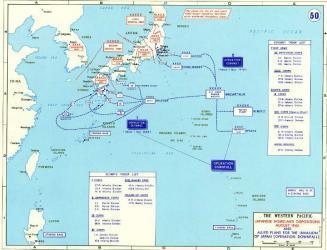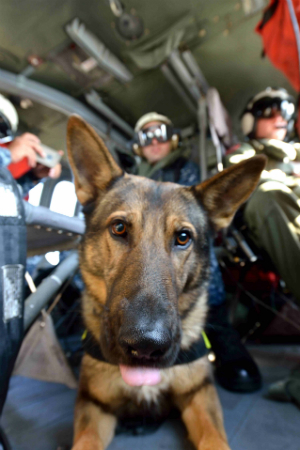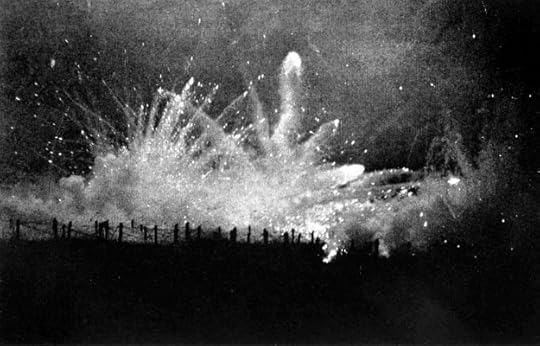Thomas E. Ricks's Blog, page 73
December 9, 2013
We should make Nov. 1 a national holiday

Speaking of Pearl Harbor Day, why not
make November 1 an annual holiday? That was the day in 1945 that President
Truman had selected for the beginning of the American
invasion of Japan. We all should be glad it never had to
happen.

December 6, 2013
Tom reviews 'The Cambridge History of War, Vol. IV: War and the Modern World,' and learns a whole bunch of new stuff

This is a pretty amazing book. If it were priced
reasonably, rather than insanely, I'd recommend getting it just for the table
of contents, the footnotes, and the bibliographies.
And there is lots to like in the book's 26 essays, which
cover from the mid-19th century to today. The speed of this ambitious romp
through history is sometimes breathtaking. The American Civil War, for example,
gets three pages. The Spanish Civil War gets a page or two in one essay, five
more in another. (Btw, I didn't know that roughly half the Spanish army, and 70
percent of its generals, sided with the Republic against Franco's rebellion.)
And this book isn't just about wars -- it is about doctrine,
PoWs, culture, military occupations, the effects of decolonization, and so on.
Even Hogan's Heroes gets a shout-out.
To cover all that, you need to move through history fast, distilling a lot of
information and so sometimes launching some pretty big assertions. Geoffrey
Wawro, discussing technology in the pre-World War I era, writes that, "The
great, blinding conceit of modern armies was that they could win by pluck and
morale."
I didn't like the occasional bouts of academic jargon in
Eugenia Kiesling's essay on "Military doctrine and planning in the interwar
era," but I was taken by some of her observations on military culture in that
time. She detects in the Japanese army before World War II "A culture that
justified insubordination, if it was committed in the name of Japan's warrior
spirit," which "led junior officers from the army to murder a prime minister in
1932 and to attempt to overthrow the government in 1936." Likewise, she sees in
the U.S. Army of that time "additional evidence that in shaping technological
choices, institutional culture tends to trump both strategic vision and
operational planning."
It also is amazing to me that there is always more to learn.
For example, I've read hundreds of books on World War II, but I did not know
that as "late as 1938, about half of U.S. light artillery was horse-drawn." Nor
did I know that the climactic battle of the Chinese civil war, in late 1948,
was the biggest battle between the end of World War II and the beginning of the
Iran-Iraq War in 1980.
Gerhard Weinberg also does a masterful job of summarizing
all of World War II, Europe and Asia both, in 32 pages. How? In part by
summarizing entire campaigns in just a few succinct lines. Here is how, in
three sentences, he explains why the Pearl Harbor attack was a failure on three
levels -- strategic, operational, and tactical:
First, by ensuring the Americans would insist on a crushing
victory, it destroyed the Japanese concept of making extensive conquests and
then arriving at a new settlement. Second, the shallow waters of Pearl Harbor,
of which the Japanese were aware, meant that most of the warships that Yamamoto
imagined sunk were instead set into the mud, raised, repaired and returned to
service. Third, the attack on ships in harbor on a peacetime Sunday failed to
eliminate the crews of most of the ships.
Tom again: One downside to the book is that these are
academics writing, so sometimes you get sentences such as, "This chapter looks
beyond this narrative and telos of World War II in three contexts." (In
academia, "narrative" seems to be a bad thing, a snide putdown like
"conventional," and almost as contemptible as "popular history." I don't understand
why, as narrative is the most human of traits -- it is how we make sense of the
world. Anyway, I'll see you a telos and raise you a conatus.)
Footnote for those who believe the British generals of World
War I have been cleared of the donkey charge by recent research: Michael
Niberg, in his overview of World War I, concluded that the British were
"unimaginative" at Passchendaele and risk-averse after Cambrai. He also makes
the interesting observation that "casualty rates were higher during periods of greatest
mobility."
Still, a lot of fun, if you can persuade your library to buy
it.
Quote of the day: General Trainor on the loneliness of today's new veterans

Retired Marine Lt. Gen. Bernard
Trainor (and author, too) looks back at
his returns from wars in Korea and Vietnam and discerns a major difference in
the world today's vet finds when he comes home:
Today's all-volunteer soldier is alone; very
few of his peers have served in the military, much less gone to war. Rarely are
there guys to hang out with at a Manion's. Earlier, the American Legion, the
VFW and reunions were a refuge of comradeship. But those are dying
institutions, and today's veteran is not a joiner anyway. He is largely
isolated, with only his iPhone as a comrade. Wounded or whole, modern veterans
speak of yearning to be back with their units, no matter how unpleasant it
would be. Many feel alone, no longer a member of Henry V's "band of brothers."
Rebecca's War Dog of the Week: A boost for Navy dog handlers

By
Rebecca Frankel
Best
Defense Chief Canine Correspondent
The Marine Times reported this week that "[t]he Navy's
Center for Security Forces is in the final stages of creating the first
apprenticeship trade program for those with military specialties that involve
working dogs." If the Department of Labor approves the program, it means that
that "hundreds" of MWD handlers in both the Navy and the Marine Corps will be
eligible for apprenticeships that will not only potentially "boost [their]
military career, but also help [servicemen and women] land a law enforcement
gig" after they retire from the military, say with a police department K-9 unit
or with a private security company.
This is especially encouraging
news as many retiring military servicemen and women are finding it difficult to
find jobs in the civilian workforce. The Washington
Post reported in November that the "unemployment
rate for recent veterans remains incredibly high -- around 10 percent --
and remains noticeably higher than it is for non-veterans in the same
demographic group."
Should this new program receive
the expected approval, it will, says MA Jose Bautista, programs manager at the
Navy's Center for Security Forces, offer "concrete documentation of your skills
and experience, and that's what selection boards love to see. That same
documentation enhances someone's marketing potential in the civilian workforce
when their military service is complete for the same reasons. I've seen many
apprenticeships on the résumés of senior enlisted sailors who've walked out of
the Navy's door into very good civilian careers."
And for many handlers, this is
good news for handlers for another reason entirely: Life after the military
doesn't have to mean a life working without dogs.
Above,
MWD Rex, of Naval Air Facility Atsugi Naval Security Force, lays
on the deck of a MH-60S Seahawk helicopter during an aerial training exercise
for K-9 units. Rex and his handler are participating in readiness training for
future deployments through accumulation of scents, movement, and the feel of
riding in, and being around helicopters.
Rebecca
Frankel is special projects editor at Foreign Policy.
December 5, 2013
Lessons of 1940: The hardest decision might be the persuasive one, while a disaster might lead to later success

Those are thoughts
that occurred to me after reading about Churchill's decision in the summer of
1940 to attack the navy of France, which had been an ally just a month earlier,
and which certainly was not at war with the United Kingdom. More than 1,200
French sailors were killed in the attack, while the British suffered two dead.
The purpose, of course, was to prevent the French fleet from falling into German
hands (as had happened with Austrian gold and Czech weapons factories).
President Roosevelt,
knowing how difficult a decision it was to launch a surprise attack against a
former ally, was said to have calculated that his defeatist ambassador to London,
Joseph Kennedy, was wrong, and that in fact Britain was determined to fight on
alone. (Speaking of FDR, it took me a while to remember the names of his three
vice presidents, but eventually I did. But for the life of me I couldn't
remember who Truman's veep was, and had to look it up.)
On the other hand, I
was interested to read in Cambridge History of War, Vol. IV: War
and the Modern World that one reason the Germans couldn't invade England later
that same summer was because of their naval losses the previous spring in
fending off the British attempt to take Norway. "While the victory of the
British in the Battle of Britain was won in the air," Gerhard Weinberg writes
in his fine essay on World War II, "the German failure to attempt an invasion
was due at least as much to their naval losses in the Norwegian campaign."
That British attack
on Norway long has been regarded as a disaster. Reading about its beneficial
effect on the Battle of Britain makes me think that Churchill may have been
right in his view that in conventional warfare, doing something, even at the
periphery, is always better than doing nothing at all.
As Bob Dylan or Clausewitz once
observed, nothing is easy in war, because friction makes even easy things
difficult.
What means this 'wind down' a war?

The editor's page in the November issue
of Proceedings begins with the phrase
"As the wars in Iraq and Afghanistan wind down...."
Putting aside the fact that the war in
Iraq is not winding down, and no hit on Proceedings
editor Paul Merzlak, what does that phrase mean? I mean, we all use it. I think
I have used it, and I know some of youse have in comments on this page (because
I checked).
As I read it, it occurred to me that this
phrase has become very popular in the last couple of years, but I have no idea
what it really means. If I had to guess, I'd invoke T.S. Eliot:
This is
the way the world ends
This is
the way the world ends
This is
the way the world ends
Not with
a bang but a whimper.
Almost like we just got bored with our
wars.
Outside the drawdown and looking in

By
Emerson Brooking
Best
Defense guest columnist
Although the drawdown has left scars across
every level of the armed services, it poses some of its biggest challenges for
those at the start of the commissioning pipeline. Rapidly decreasing numbers of
slots, a surplus of qualified candidates, and a universal lack of information have
combined to make today's application process deeply uncertain. Many strong
applicants -- shoo-ins just a few years ago -- must now try repeatedly for a
ticket to OCS, effectively putting their lives on hold. Many still will not
make it. The situation raises tough questions without good answers.
I've watched this process unfold as both a
Marine Corps applicant and an active observer to discussions surrounding
defense budget reductions. Officer wannabes struggle to stay free of doubt as
they put their spirits into commissioning programs that could abruptly cease to
exist. Meanwhile, grim numbers thrown around by policymakers suggest that the
situation will likely get worse before it gets better. While my experience is
specific to the Marine Corps, I suspect the story is similar for folks on the
Army side.
Anonymous forum boards like Marine
Corps OCS provide a window into the mindset of today's aspiring candidates.
Amid standard topics like pull up techniques and essay tips can be found a
growing number of discussion threads that reflect more fundamental
concerns: Could my application ever make it? Will there even be slots
available? At what point should I stop trying -- and what could I possibly do
instead?
When applicants' final packets have been
submitted for consideration, they often post their "stats": their
school of graduation, their PFT, their GPA, number of waivers, and status of
their recommenders. This is done both for the benefit of the community and for
the aspiring candidate's own peace of mind. It's difficult to read these posts
and not think immediately of sites like College
Confidential, where stat-filled "chances" threads provide elite college
applicants an opportunity to measure themselves against the competition.
Between each of these worlds, the same earnest motivation bleeds through. So
does the same numb despair when word of rejection arrives.
While the college analogy provides a good
fit for today's officer selection process, there's a crucial difference. This
is an admissions process in which even basic information like average scores
and acceptance rates remain hidden from view, and where the number (and even
existence) of some commissioning program slots can change overnight. Only the
broad trend is clear: steeply rising standards and rapidly shrinking odds.
There are numbers of truly qualified
candidates -- exemplary leaders, fitness gods -- who have now thrown themselves
several times through the application cycle without success. In the interim,
many effectively put their lives on pause, drifting from one job to the next
while reserving the start of their real career for the Corps. With the defense
budget continuing to deflate, they may never get a shot. It's an open question
what these "could-have-beens" will pursue in place of service. In any
case, one suspects the really serious ones won't talk about it much.
Emerson
Brooking has worked as a journalist and is currently a DC-based defense
researcher. He's just signed up for his first marathon and would welcome
training tips at
etbrooking@gmail.com
.
December 4, 2013
Bob Dylan knew what he was talking about when he wrote 'Masters of War' -- plus his thoughts on Army recruiting!

I noticed the other day with surprise
that Bob Dylan's website lists among books that influenced him Clausewitz's On War. I wonder if there are any other
pop artists influenced by that book? Maybe Eric Burdon or Edwin Starr?
What is weird is
that as I typed this, a Bob Dylan song came on the radio -- "Rainy Day Women,"
which I don't even like. Btw, he isn't just an icon of the ‘60s. There are a
ton of Dylan songs over the last 20 or 30 years that I think are great and
should be better known -- "A Sweetheart Like You" (which I think is about an
assistant to Lucifer talking to a morally lost woman), "Jokerman"
(which I think in part is Dylan talking about himself, and about other false
idols), "Working Man Blues No. 2" (with its refrain about
fighting on the front lines), and another recent song, "Thunder on the
Mountain," which speaks to the issue of military personnel with a neat rhyme:
Gonna raise me an army, some tough sons of bitches
I'll recruit my army from the orphanages
Well, it works the
way he sings it.
PS -- While we are
on the subject of music, you should check out . Good music, no ads. I used to
listen to it while in Baghdad to get my mind off the war. Now that I think of
it, it is kind of ironic -- being in Hell but listening to the music of
Paradise.
Quote of the day: The significance of Cantigny for the U.S. military and nation

From a book review
by Mark Grotelueschen in the October issue of The Journal of Military History:
Although the
infantry assault was conducted by just one reinforced regiment, the attack was
supported by the rest of the 1st Division (itself nearly half the size of Lee's
entire army at Antietam), thirty French aircraft, a squadron of French heavy
tanks, a section of French flamethrower troops, a wide variety of
communications technologies, and over 250 pieces of French and American artillery (about a hundred more than Lee used to support Pickett's Charge at
Gettysburg), Cantigny truly was the U.S. Army's baptism into modern battle."
I'd never thought of
it that way, partly because it is hard to judge by reading first-person
accounts, which is mainly what I read when, as research for my book The Generals, I was looking at George
Marshall's experience in World War I.
Arkin: Hey dumbasses, it's not Vermont you have to worry about, it's the country

Bill Arkin, a man of his convictions,
has the heart & soul to take
his fellow Vermonters to task about where to base
F-35s:
The
roar of F-16s or F-35s might rupture the peaceful image of Vermonters, nice
people who think that they can create some sanctuary and drop out of the
national tragedy. They should spend their energy instead going to war against a
national security system that can no longer police itself, and one that no one
in Washington has any intent of changing.
Thomas E. Ricks's Blog
- Thomas E. Ricks's profile
- 437 followers



